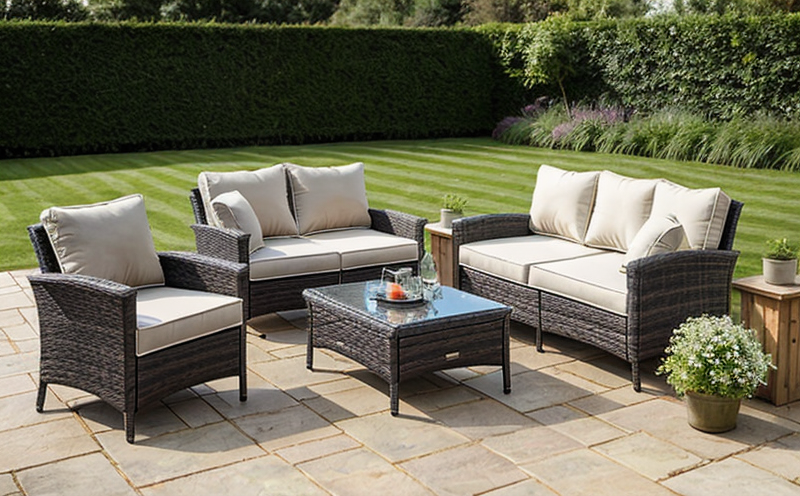CSA O121 Structural Plywood Used in Outdoor Furniture Testing
The CSA O121 standard addresses structural plywood suitable for use as a base material or core component in outdoor furniture. This standard ensures that the plywood used in such applications meets stringent durability and strength requirements, making it ideal for long-lasting outdoor products.
The testing of outdoor furniture made from structural plywood begins with selecting the appropriate grade and species of plywood based on the intended use. Structural plywoods are characterized by their cross-laminated layers, which provide enhanced strength properties compared to solid lumber. For outdoor applications, particular attention is paid to moisture resistance (Janka hardness) and stability under varying environmental conditions.
The testing process involves several key steps: material selection, specimen preparation, mechanical testing, and environmental exposure tests. The specimens are subjected to a series of mechanical load tests using universal testing machines to assess shear strength, bending stiffness, and modulus of elasticity. Environmental aging tests simulate real-world weathering effects like ultraviolet radiation, moisture cycling, and temperature fluctuations.
Compliance with CSA O121 ensures that the structural plywood used in outdoor furniture meets rigorous performance standards, which is crucial for product longevity and safety. This standard also plays a role in ensuring consistent quality across different manufacturers by providing clear guidelines on material properties.
The testing protocol must follow strict procedures to ensure accurate results. Specimens are prepared according to specified dimensions, surface finish, and orientation of the layers. Mechanical tests assess how well the plywood resists deformation under load while maintaining structural integrity over time. Environmental exposure tests expose samples to controlled conditions that mimic outdoor environments for extended periods.
Adherence to CSA O121 helps manufacturers produce durable, reliable outdoor furniture that can withstand harsh weather conditions without compromising safety or aesthetics. It supports sustainable manufacturing practices by promoting the use of high-quality materials that last longer and require less frequent replacement.
| Test Parameter | Description |
|---|---|
| Janka Hardness | Measures resistance to denting or indentation, ensuring durability in outdoor settings. |
| Shear Strength | Evaluates the plywood's ability to resist splitting along grain lines under shear forces. |
| Bending Stiffness and Modulus of Elasticity | Determine how much a sample will bend before breaking, providing insights into its structural reliability. |
| Moisture Resistance | Assesses the plywood's resistance to swelling or shrinking when exposed to varying humidity levels. |
The testing process ensures that each batch of plywood meets specific performance criteria, contributing to the overall quality and reliability of outdoor furniture products. Compliance with CSA O121 is essential for manufacturers aiming to produce durable, safe, and aesthetically pleasing furniture designed specifically for use outdoors.
Industry Applications
- Outdoor tables and chairs
- Garden benches and loungers
- Playground equipment
- Picnic tables and seating
- Balcony furniture
The use of structural plywood in outdoor furniture ensures that these products can withstand the elements, including rain, snow, sun exposure, and temperature changes. Structural plywoods are particularly favored for their ability to maintain stability under varying environmental conditions, which is critical for outdoor furniture longevity.
Testing according to CSA O121 helps manufacturers ensure that the plywood used in their products meets stringent durability standards. This standard ensures that the structural properties of the plywood meet or exceed required levels, providing a foundation for reliable and long-lasting outdoor furniture.
Eurolab Advantages
At Eurolab, we specialize in providing comprehensive testing services that help manufacturers ensure their products comply with international standards like CSA O121. Our state-of-the-art facilities are equipped with advanced testing equipment to accurately assess the mechanical and environmental performance of structural plywood used in outdoor furniture.
Our experienced team of engineers and technicians ensures that every test is conducted rigorously, following strict protocols established by relevant standards organizations. We provide detailed reports outlining the results of each test, helping manufacturers identify areas for improvement and optimize their production processes.
We also offer a wide range of other testing services, including dimensional stability tests, moisture content analysis, and chemical resistance assessments. These additional tests ensure that all aspects of the plywood's performance are thoroughly evaluated, providing comprehensive data to support product development and quality assurance efforts.
Our commitment to accuracy, reliability, and customer satisfaction has made Eurolab a trusted partner for many leading manufacturers in various industries. By choosing us as your testing partner, you can rest assured that your products will meet the highest standards of performance and durability.
Competitive Advantage and Market Impact
Compliance with CSA O121 provides significant competitive advantages for manufacturers by ensuring that their outdoor furniture is among the most durable, reliable, and aesthetically pleasing products available on the market. This standard sets a benchmark for quality, helping companies differentiate themselves from competitors who may not adhere to such rigorous standards.
By meeting or exceeding the requirements outlined in CSA O121, manufacturers can gain a competitive edge by offering superior products that meet consumer expectations regarding longevity and safety. The standard's emphasis on environmental resistance ensures that these products perform well even under extreme weather conditions, which is particularly important for outdoor furniture used in diverse climates.
Additionally, compliance with this standard can enhance the reputation of manufacturers and their brands, making them more attractive to discerning consumers who value quality and reliability. This heightened brand perception can translate into increased customer loyalty and potentially higher sales volumes.





